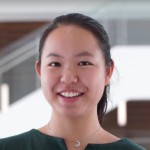Congratulations to student researchers, Erin Greig and Reika Shimomura, on leading the Public Health Ethics Research Project funded by the HRC’s Health Humanities Lab.
Please join us in celebrating their accomplishments and read an interview with Reika and Erin about this project below.
PROJECT SUMMARY
PROJECT ACCOMPLISHMENTS
-
- Published an abstract of initial findings at the 2021 APRU Global Health Conference with the title, “Global History of Digital Contact Tracing during COVID-19 Pandemics and Ethical Considerations for Privacy in Digital Contact Tracing Apps”
- Participated in Global Health Poster Competition hosted by Global Health Research Center at Duke Kunshan University and received first prize.
- Published a paper in the Journal of Public Health and Emergency (JPHE) which was an invitation from the journal through the conference “An evaluation of privacy policies used in digital contact tracing apps for COVID-19.”
INTERVIEW WITH ERIN GREIG & REIKA SHIMOMURA
What was your inspiration to start this project?
Our initial inspiration for this project was seeing just how much the COVID-19 pandemic altered the lives of people across the world. It was, and still is, such an unprecedented time, but the silver lining in these events is the opportunity to learn. We saw a chance to learn about these digital contact tracing apps that seemed to boom in the early pandemic, which we thought would be interesting since we live in a world that is surrounded by technology. We also learned about the role of community health workers in our global health courses, and were interested in the differences between these crucial workers and technology. There were many concerns about the new disease controls that different governments were implementing and we were curious about how the public was perceiving them and what made them more willing to or less willing to follow the guidelines.
Could you share the process of this research project and how you brought it to completion?
The project first started as an investigation into COVID-19 in general. We recognized that this pandemic, while heartbreaking to watch unfold, was an opportunity to learn. We met weekly with Professor Weissglass to explore different approaches to research and shared our thoughts on what directions of research that we could take. We started by reading existing literature on foundational approaches to bioethics, infectious disease control ethics, and quarantine and liberty before narrowing in on digital contact tracing, a topic we both found interesting.
We came across existing World Health Organization (WHO) guidelines for digital contact tracing, and adapted them to evaluate existing privacy policies of digital contact tracing applications used during COVID-19. As DKU students, we have friends all over the world using a plethora of apps and were curious as to whether these applications were adhering to these guidelines and protecting individuals data and rights.
We went through privacy policies from official applications across the globe and found that in many cases, the applications fell short of the WHO gold standard. After drafting our abstract with our initial findings, we submitted the start of our project to the Global Health Conference: Global Urban Health hosted by The University of Hong Kong and Association of Pacific Rim Universities. Our abstract was accepted, allowing us to present our work to policymakers, environmental activists, and students like ourselves in November 2021. We also accepted the offer to publish the full manuscript in the Journal of Public Health and Emergency (JPHE), which was published July 2022.
With the help of our mentors, Professor Meifang Chen and Professor Daniel Weissglass and the editing team at JPHE, we were able to produce our final manuscript and become published undergraduates. Since most of the core research work had been completed for the initial abstract submission, lengthening to a full length paper was more about telling the story that we discovered rather than feeling like we were back to square one. During the manuscript writing, we also submitted our work in the Global Health Research Center’s Global Health Poster Competition at Duke Kunshan University and won first place.
Could you share some of the challenges you had with this project?
One of the biggest challenges for us was narrowing down to a specific project. We found that once you start that initial literature review, there are so many different avenues that you can take. Even when you are writing the manuscript, we found ourselves eager to chase new information before having to restrain ourselves to the scope of the paper.
Another challenge was to think of the bigger picture of how the results we found can convey an actionable message for policymakers and application platforms. The feedback from the editors at JPHE was a great inspiration for us to further sharpen our observations of the results we had, and we were thus able to produce a stronger paper for publication.
What have you learned from this project?
Aside from the story of privacy policies during COVID-19, we learned how to be independent researchers. As undergraduates, mentorship is a crucial part of growing, but tackling and taking the lead on a project conceived by two undergraduates is a whole different beast. We of course had people we could ask our many questions to, but the bulk of our work (topic selection, research design, task-designation, timeline, conference perusal, editing) was just run by the two of us. We believe that it sets us up well for a future career in research and investigation, and we love how the project challenged us to be independently curious.
What are you most proud of?
What we are most proud of is also tied to what we learned. Growing up, people told us not to be too disappointed if we didn’t get to publish as undergraduates. Now, having our first published paper be from an undergraduate-run project co-written by both of us, having learned how to independently research, it’s definitely fuel to a fire. We want to do more of this exploration and we’re eager to get started.
What are your next steps?
As both of us are in the global health major with biology track, we are thrilled that we had this opportunity of working together with common interests and accomplishing the final goal of this project, which was the publication of a paper together. After publishing, we are diverging for a while at this fork in the road for our respective Signature Work (senior thesis project).
Reika: I am planning to continue my signature work in a similar field where I would be investigating the COVID-19 Task Force on campus and how students perceived the university’s interventions from the perspective of Belmont Report’s three principles: respect for persons, beneficence, and justice. With the funding from Freedom Lab at DKU, I hope to provide an opportunity for the community to be heard by the upper-level decision makers of the institution and improve the future implementation of interventions.
Erin: I, on the other hand, am branching out into other areas. My signature work investigates the impacts of Alzheimer’s on women in the 1980’s. I’ve been feeding my interest in aging and cognitive decline recently through shadowing physicians in geriatrics and attending a conference on Alzheimer’s, so I’m looking forward to continuing to work on my signature work in this field for a while and working in an in-person laboratory on novel research.
Biographies
Student Researchers
Erin Greig

Erin is an undergraduate majoring in Global Health with a concentration in Biology graduating in 2023 from Duke Kunshan University (DKU) with a dual degree from DKU and Duke University. She is a pre-medical student interested in pursuing a career in a field related to aging and cognitive decline. She is currently the Director of the International Shadowing Program, a subdivision of the pre-medical club at DKU, and involved in Alzheimer’s and Global Health research.
Reika Shimomura

Reika is an undergraduate student (Class of 2023) at Duke Kunshan University (DKU) pursuing a dual degree at DKU and Duke University. Her major is Global Health with a concentration in Biology, and currently working on global health ethics research and chemistry education research. She is passionate about education and co-founded MediHealth Podcast under HHL, a student-led science podcast.
Faculty Support
Meifang Chen

Prof. Meifang Chen is an Assistant Professor of Health Policy at Duke Kunshan University. She is a public health specialist with rich work experience in a wide range of public health context, including as a registered nurse in hospital, as a health educator in the state health department, and as researcher/program evaluator/consultant for local and statewide health programs in the U.S. Her research aims to promote holistic wellbeing and prevent chronic diseases, especially among underrepresented and underserved populations. She is particularly interested in using mixed methods and GIS mapping and modeling to investigate the root causes of chronic diseases, from a humanistic perspective, and develop and evaluate culturally- and population-tailored health programs and policies.
Daniel Weissglass

Prof. Weissglass is an Assistant Professor of Philosophy at Duke Kunshan University and an interdisciplinary philosopher with expertise in the ethics of science, healthcare and technology and in cognitive science. His research projects focus on the intersections of the humanities with healthcare, sciences, psychology, and political/economic theory among many others.